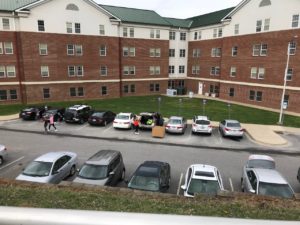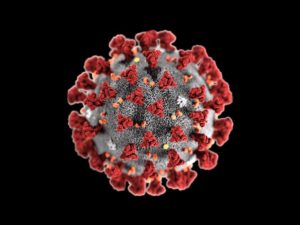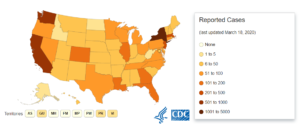with additional reporting by Nicole Ellison.

Students leaving campus after WCU leaders said they should not come back to campus for the rest of the semester. Photo by WCJ, March 19, 2020.
Western Carolina University is moving classes online on Monday, March 23, and students should plan to continue online or alternative instruction as directed by their professors through May 8.
In response to the ongoing global coronavirus pandemic, WCU is postponing all spring commencement ceremonies originally scheduled for May 8 and 9, and will announce by April 3 plans for rescheduling the events.
Decisions about summer courses and activities beyond study-abroad programs, which already have been canceled, will be announced by April 3.
“I completely understand that commencement is a deeply meaningful event for our students and their families. I realize that postponing these ceremonies will disappoint our students who have worked toward this goal for so many years and their family members who have supported them,” Brown said in an email statement. “But the health and safety of all members of our campus community must be our top priority. We must do all that we can to help stem the spread of the coronavirus, and postponing large-scale events such as commencement is one of the things that we can do.”
Earlier this week, Chancellor, Dr. Kelli Brown, said in a statement regarding on-campus residential living, “effective Wednesday, March 18, and until further notice, students who live on campus must either remain at their permanent address or return to those homes unless an exemption is granted by the university.” Western Carolina University’s updated changes will also affect Hunter Library, campus dining, health services and more.
The statement comes after new information from the Center for Disease Control and Prevention (CDC) was released, as well as meetings between University of North Carolina (UNC) System officials with Gov. Roy Cooper.
In the chancellor’s statement, group gatherings with more than 50 people must be cancelled and meetings with more than 10 people “requires supervisor approval.”
Further information was sent out via a separate email from Residential Living to all students living on campus. Students are being encouraged to retrieve “essential items” from their rooms by Saturday, March 21. After this date, card access will only be available for “students who have special circumstances and who complete an Exemption Request.”
Students had until noon on Thursday, March 19, to complete an Exception Request. According to Residential Living, “special circumstances include: international student status, homelessness, academic course meeting face-to-face, and other extraordinary circumstances [that] will be reviewed on a case-by-case basis.”
In the email, Residential Living also commented on the frequent question regarding refunds. “[WCU] is a part of the UNC system and System leadership has a strong desire to have a system level approach to any discussion of refunds.” Residential Living continued by saying that guidance from the UNC System would come at a later date.
In a March 15 statement, Brown also mentioned that “Interim UNC System President Bill Roper has directed that all UNC System institutions recall all students who are studying abroad and suspend any study-abroad programs scheduled to begin between now and July 1.”
There have been many changes and updates across campus. Since Tuesday, March 17, Hunter Library allows access only to WCU students, faculty and staff with their Cat cards. Students are encouraged to use online chat services if assistance with research is needed. The library will also be extending due dates for any materials checked out till the end of the semester and any fines will be waived. Hours of operation will be 8 am – 5 pm through March 20 and regular hours will resume starting March 22.
Other services affected include campus dining “which will offer only a limited number of options with hours subject to change providing take-out service only,” according to the statement issued by the chancellor. Chili’s will close starting March 19, meanwhile the Courtyard Dining Hall, Starbucks at the Courtyard, Chick-fil-a, C-Store at the courtyard, and Freshens will only provide takeout. All other locations are closed.
Counseling and Psychological Services (CAPS) and health services will now require students to call ahead of time to schedule an appointment in an attempt to minimize the risk of spreading “infectious illness.”
The IT Help Desk will be extending coverage to students, faculty and staff during this time.
Students, faculty and staff should check their emails or visit www.wcu.edu/coronavirus/index.aspx for further updates regarding COVID-19.
Students Respond
Students had many questions and concerns after the statements. In response, the university released a list of frequently asked questions to relief any stress caused by the decisions.
Spencer Caraballo, sophomore, said, “the virus would have been serious if it was 1920, but with modern medicine, no, it’s not [serious]. Summer will come soon, and with it goes the virus.”
The same sentiments were echoed by President Trump during a campaign rally. “Looks like by April, you know, in theory, when it gets a little warmer, it miraculously goes away. I hope that’s true,” the president said.

COVID-19 illustration. Source: Center for Disease Control and Prevention
The CDC disagrees, adding an FAQ on their website regarding this theory that warmer weather will kill the virus saying, “at this time, it is not known whether the spread of COVID-19 will decrease when weather becomes warmer.” Adding that there’s still much to learn regarding the impact of the virus.
The president has since changed his opinion on the matter.
Caraballo continued saying that online classes were an inconvenience to him. “I’m paying good money to access classes and I feel like that’s being taken from me.”
Brittany Hormel, junior, also felt that switching to online classes is an inconvenience “because my current classes have a lot of group projects which will now be difficult or awkward to accomplish.” However, she does understand the quick changes the university had to comply with.
“I think we should be worried for those [who] are susceptible, not go crazy and hoard supplies,” Hormel added. A commentary to what is occurring across the country as sanitary supplies are emptied off shelves.
Students also had the opportunity to share their thoughts on the virus via Instagram with the help of “catzgowild” – an Instagram page dedicated to WCU students’ lifestyles.
Nathan Robinson, sophomore, commented, “I think we as students are not realizing the gravity of what is at hand with COVID-19.”
Meanwhile, James Simon, freshman, said, “it was a matter of time that this would happen, it is now our job to reduce the number of cases.” Adding it is our individual “responsibility to self-quarantine and practice social distancing” in an attempt to reduce the spread of the virus.
COVID-19 in Neighboring Counties
In neighboring Macon County, the first positive case of COVID-19 was alerted to the public. Macon County Public Health issued a press release which explained that a New York resident had traveled to Buncombe County where they started showing symptoms. They were tested in Buncombe County and then traveled to Macon County, where they own a home, to self-quarantine.
The press release also said, “the test conducted by the North Carolina State Laboratory of Public Health, is presumptively positive and will be confirmed by the Centers for Disease Control and Prevention.”
To read the full press release click here.
Gov. Cooper had issued an executive order mandating all public schools to close for two weeks as a precaution measure. Schools in both Jackson, Macon and other counties are continuing to provide free breakfast and lunch to all students and children under 18 years of age.
According to the Carolina Public Press, 40 people in North Carolina have tested positive for the virus. This has prompted drive-thru testing sites in a number of counties, including two in Buncombe County. Thus far, testing is free for those who show symptoms which may include fever, shortness of breath and coughing. The CDC also states that symptoms may appear 2-14 days after exposure.
The Carolina Public Press also reported on Dare County closing its borders, and that entry into the county will require a permit. The county has had no reports of COVID-19 and would like to keep it that way.
At the time of publishing, no official case of COVID-19 has been reported in Jackson County.
COVID-19 in the U.S. and Abroad
Health experts recommend good hygiene such as washing your hands with warm water and soap, covering coughs and sneezes into the elbow, and avoiding touch to the face (especially the mouth and nose). It is also recommended to practice social distancing to further prevent the spread of the virus.

Map of the U.S. with reported COVID-19 cases. Source: Center for Disease Control and Prevention
According to the CDC over 7,000 cases have been reported with 97 deaths in all 50 states, the District of Colombia, Puerto Rico, Guam and the U.S. Virgin Islands. Washington state, California and New York are the most affected in the U.S.
Gov. Andrew Cuomo of New York “is urging all New Yorkers to stay at home as much as possible” and has recommended to practice safe distancing of 6 feet. Meanwhile, in San Francisco, the mayor has ordered people to stay home unless for essential activities such as going to the doctor or buying groceries. The order also calls for the closure of non-essential establishments such as bars and gyms. The order will be in place until Apr. 7.
Across the country, including in North Carolina, restaurants, coffee shops, bars and other establishments are being required to stop having customers dine in, offering only takeout. Other establishments such as movie theaters and gyms are closing in some communities.
On March 11, the World Health Organization announced the COVID-19 outbreak as a pandemic. According to John Hopkins University and Medicine, there are over 227,000 cases of the virus worldwide and over 9,300 fatalities. These numbers are expected to rise.



